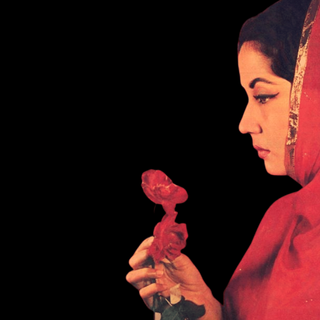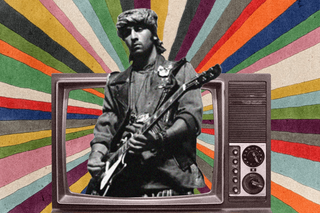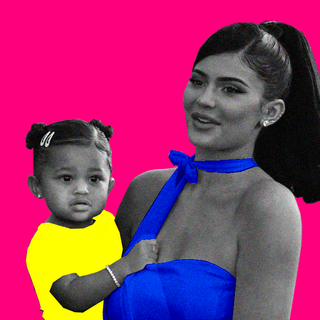
Can We Move On: From the Trope of the Male Artist Whose ‘Genius’ Gives Him a Pass to Be a Jerk
From ‘Abhimaan’ to ‘Rockstar,’ we have to stop pandering to the male artist’s ego that treats people–and female protagonists–like doormats.

In Can We Move On, we revisit old tropes and question whether they have any remaining cultural relevance.
There are several things wrong with Rockstar. It promotes the toxic trope of the “tortured artist.” It depicts the protagonist, Jordan, as constantly “harming Nargis Fakhri’s character… just because he can’t make up his mind.” Among his many flaws, Jordan also embodies the role of an artist who uses his talent and popularity as a free pass to get away with treating people poorly.
Bollywood is full of examples of toxic behavior from artists — most commonly males, and one too many times, played by Ranbir Kapoor. Ae Dil Hai Mushkil is yet another movie where his character struggles to wrap his head around the fact that a woman he is attracted to might see him as just a friend. And so, in an arrogant endeavor to prove to her that she loves him but doesn’t know it, he uses yet another woman to make her jealous. However, given that both of these women were actual persons with agency, they saw through his behavior and parted ways with him rather than being mere pawns in his toxic masculine universe. But this must be for the greater good because, at least, his pain “transforms” him into a renowned musician. Right?
If I were in the place of either of these women, his emotional manipulation tactics would’ve, undoubtedly, left me with trust issues to deal with for years. But, hey, as long as his musical talent is enriching the lives of his fans in the Ae Dil Hai Mushkil-universe, the trauma must be worth it, no? At least, that’s what Bollywood movies have led us to believe. The trend goes far, far back.
In Om Jai Jagadish from the early 2000s, we see Annu Kapoor’s character, a musician, treat people terribly. His justification for his behavior? Well, he’s talented, so people must learn to put up with it. Thankfully though, his arrogance does pave the path for his downfall, and we see his popularity soar again only after he has mended his ways. However, his “lesson learned” was too little to erode the appeal of the largely fossilized trope.
Arguably though, a fossil is what the trope should’ve become – a remnant of a bygone era. But with several of Bollywood’s leading actors, even the contemporary ones, continuing to play these roles, I feel pretty hopeless making my argument.
The abusive behavior these characters demonstrate exists on a vast spectrum. In Abhimaan, Sur, and Aashiqui 2, the leading men don’t treat their female love interests well simply because the talent of these women overshadowed their own — threatening their fragile ego. Barring Aditya Roy Kapur’s character, who succumbs to his insecurities, the others are subsequently forgiven by the female protagonists because, “Hey, he just got jealous, he couldn’t help it.” The narrative conveniently forgets to point out that it was their hurt ego and male entitlement that made them treat the women so terribly — so much so that in Abhimaan, Jaya Bachchan’s character is left traumatized by Amitabh Bachchan’s character, and even goes on to suffer a miscarriage.
Related on The Swaddle:
Why the Exhausting Endurance of the ‘Tortured Artist’ Syndrome Must End
It’s hardly rare in Bollywood to condone toxic behavior by men, and movies depicting this trope often cough up excuses for it too. In Rock On, Farhan Akhtar’s character was so engrossed in his talent and popularity that he forgot to acknowledge the grievances of his fellow band-members. In London Dreams, Ajay Devgn’s character was so threatened by the popularity of Salman Khan’s character that he tried to steer him to substance abuse and actively harmed his mental health. In Gully Boy, Ranveer Singh’s character was so lost amid the sudden attention his talent was receiving that he cheated on his girlfriend. The latter was, perhaps, a lot less severe than the others, and maybe even a lot more excusable, but still furthered the same trope. If you’re wondering what the consequences of characters’ actions were, well, they were all subsequently forgiven by the people they wronged.
It’s 2021. Can someone please explain to me why we’re condoning this behavior? The fact that their behavior either boosted their talent, or helped them find their moral center, or led them to understand that they had messed up priorities, to begin with, don’t seem like good enough excuses. Where is the logic in someone doing something terrible, and growing spiritually as a result? What about the people they traumatized along the way?
Given that these characters are fictional, sure, no real person was traumatized. You’d, maybe, think I’m just getting worked up over nothing. But am I? I want to argue that the normalization of toxic behavior by artists on the big screen for decades has led us to condone their unhealthy behavior — the whole spectrum of it — even in real life.
Why else would producers think to spend Rs. 100 crores on a movie depicting how Sanjay Dutt was simply a victim of his circumstances? By his “circumstances,” I mean his socio-economic privilege, the fact that his career was almost served to him on a platter, and the fact that the “star power” of his parents made him an instant hit with the masses, among other things. Yet, the biopic simply focused on suggesting how people should never blame him for any harm he may have caused to others, because, well, what other option did the poor thing have? The filmmakers knew this was a bankable narrative. The fact that the movie made almost Rs. 600 crores, proves they were right. And it’s hardly surprising that Ranbir Kapoor yet again embodied the trope, playing Sanjay Dutt in the film.
People have written endless essays about how society has allowed male “geniuses” — creative or otherwise — to get away with bad behavior because, hey, they’re talented. Evidence of that: well, the flood of #MeToo accusations against artists in India and abroad.
The trope may be a reflection of real life, in that sense. Unfortunately, however, it also serves to maintain the status quo regarding how we deal with these creative geniuses’ toxic behavior. And if the #MeToo movement has taught us anything, this needs to change. So, can we please move on from the trope of artists using their talent as a free pass for bad behavior and stop excusing it in real life too?
Devrupa Rakshit is an Associate Editor at The Swaddle. She is a lawyer by education, a poet by accident, a painter by shaukh, and autistic by birth. You can find her on Instagram @devruparakshit.
Related


The Buzz Cut: Girlboss Launches Babycare Products For Boss Babies Who Love Self Care
